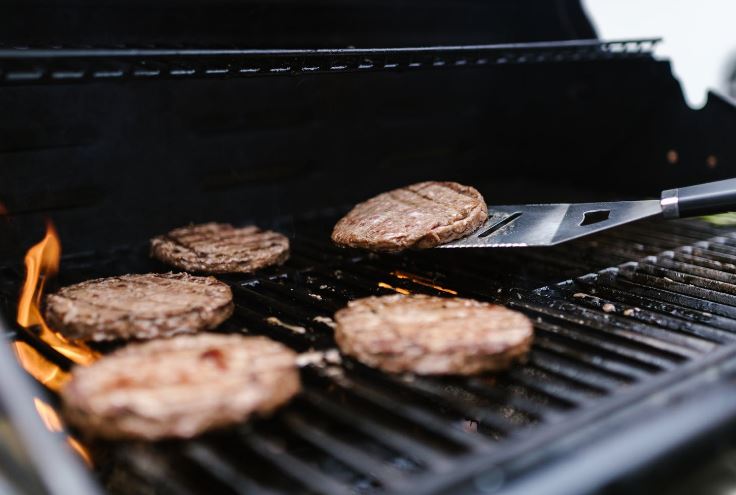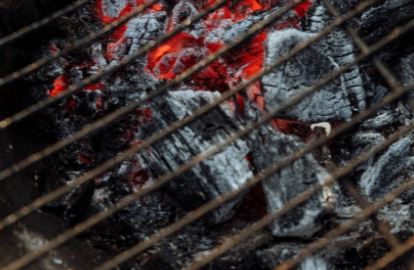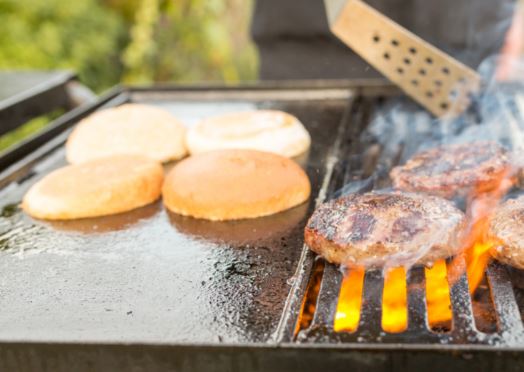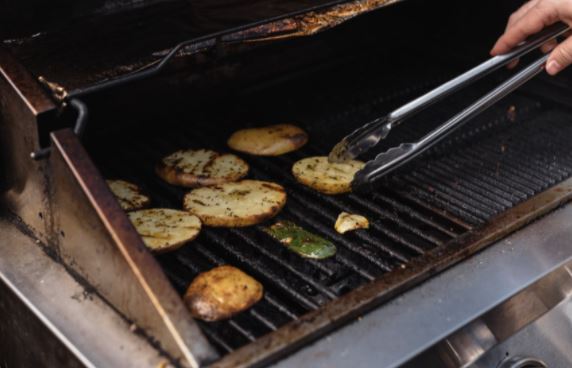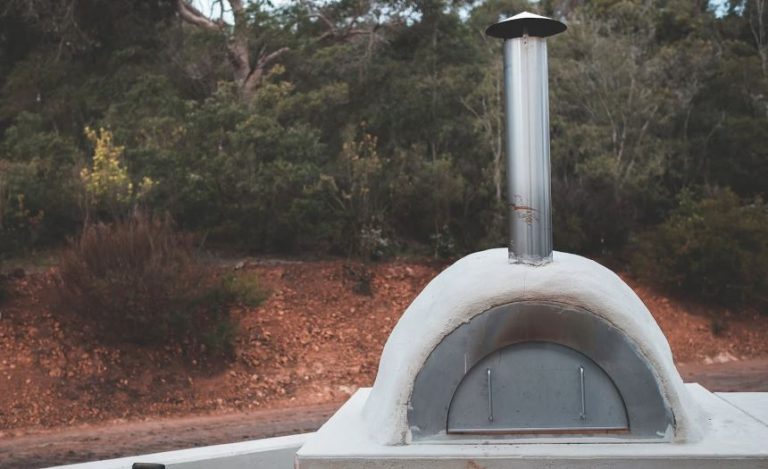How to Clean a Grill Grate
Three Different Types of Grill Grates and How to Clean Each
If you utilize one of these tips, cleaning your barbecue grill can be really quick and simple. Grill grate cleanliness is essential not just for the integrity of your grill, but also for food safety.
Dirty grates can alter the taste of your meal and may contain bacteria that might cause illness. Take notice of these easy tips for cleaning your grill grates so you can enjoy wonderful barbecue meals all season long.
Porcelain Grill Grate Cleaning
Porcelain grill grates are heat-resistant and rust-resistant, but they must be cleaned and maintained. Any chips or scrapes in the porcelain will reveal the metal beneath, allowing water to seep in and cause rust. So be careful not to scrape or nick the grates with metal objects when cooking. Metal or wire brushes should not be used to clean porcelain grill grates. Use a grill brush with soft bristles or a nylon brush. Any food that has remained on the grates should be burned off. Allow the grates to cool before cleaning them with the nylon cleaning brush.
Porcelain is a common grill grate coating because it retains heat and is resistant to rust. To get distinct grilling marks on your burgers and hot dogs, you’ll need clean porcelain.
It also makes your grilling experiences safer, as huge volumes of build-up might be a fire threat if they aren’t cleared.
When it comes to cleaning porcelain grill grates, a nylon grill brush will fix the majority of your issues, but we’ve also compiled a few recipes and tips for deep cleaning your porcelain grill grates.
1 What Kind of Brush Do You Use with Porcelain Grates?
Porcelain grates must be handled with extreme caution. The cast iron underlying the porcelain enamel rusts when it is chipped. Avoid using a wire brush or scraper tool, and stay away from steel wool.
Brushes with stainless steel bristles are frequently marketed as porcelain-safe, but keep in mind that porcelain is a sensitive material. These instruments’ abrasive nature generates fissures in the enamel, which leads to rusting.
Because even small chips can destroy the grate for good, cleaning porcelain coated cast iron grill grates differs from cleaning other barbecue grates. Scrubbing porcelain grill grates using a grill brush with nylon bristles is always the finest option.
If you don’t have one, a brass-bristled brush will suffice. Brass brushes are softer than wire brushes, so they’re less prone to scratch the porcelain.
Different varieties of grill grates have different care requirements, such as stainless steel grates, but these recipes work for most other types of grates.
2 Clean Porcelain Grill Grates After Each Use
Remember to clean your grill after each usage of porcelain cooking grates to ensure that filth does not accumulate on the grates over time. Build-up can have a detrimental impact on the taste of your food and possibly pose a fire risk.
To burn filth and leftover food particles from the cooking surface, turn up the heat on your grill. Reduce the heat and, while the surface is still warm or hot, begin brushing away the cooking oil and residual food. For the best clean, scrub diagonally.
This approach must be practiced after each grilling session if you are a frequent griller. It’s simple and doesn’t require any cleaner; all it takes is high temperatures and scrubbing.
3 Vinegar Option for Cleaning Porcelain Coated Cast Iron Grill Grates
Vinegar’s acidity aids in the breakdown of grease left on porcelain-coated cast iron grates. Make a quick vinegar grate cleaner at home with items you might already have on hand.
RECIPE FOR GRILL CLEANING
12 cup apple cider vinegar or white vinegar
1 cup water
Grill brush (nylon or brass)
Spray bottle or bowl
Combine the vinegar and water in a spray bottle or bucket to make an all-natural barbecue cleaner. Dip your brush in the bucket or spray the solution directly onto the grates.
Begin scrubbing your grill grates diagonally and watch the gunk fade away. Make sure to scrape the rack on all sides.
This solution is a natural grill degreaser that cuts through grease and oil to leave your grill sparkling clean.
You can soak your BBQ grill grates in vinegar as well.
Soak the grates in a 1:2 vinegar solution and water overnight in a big bucket or storage container. The next day, scrub with a nylon or brass brush and rinse with warm water. This procedure is comparable to using vinegar to clean oven racks in your dishwasher.
Vinegar can leave a lingering odor or taste on your grill, as well as alter the flavor of your food. After you’ve reinstalled the grates, increase the heat to burn out any remaining vinegar.
4 Using Burn Off to Get Rid of Baked-On Particles
Turn increase the heat on the grill and close the lid after you’ve finished cooking. Allow the fat and food particles to burn off on the grill. Turn off the heat and open the lid after 10-15 minutes. Allow the grates to cool somewhat before scraping the ash away using a scraper or your grill brush.
5 Cleaning Grill Grates using Baking Soda
The texture of baking soda is ideal for gently removing crud from grill grates. This approach is so simple that you might want to use it every time you have a barbecue.
Recipe for Baking Soda
baking soda, 1 cup
12 cup water Brush with nylon or brass bristles
a washcloth and a hose or bucket of water
To clean porcelain grill grates, combine the baking soda and water to make a thick paste. Apply this light abrasive directly to the grates and clean away any debris with your brush.
If feasible, flip the grate over and repeat. After you’ve scraped away the gunk, use a hose or a pail of water and a washcloth to rinse away the residual baking soda.
5 Soaking
Take the grates out of the grill a couple of times a year and soak them for an excellent deep cleaning. Mix several squirts of dish soap with hot water and about a half cup of baking soda in a large bucket, the kitchen sink, or the bathtub.
Allow the grates to soak in the liquid for about an hour. Scrub the grates from top to bottom, rinse, and dry.
6 Grate Scraping Tool (DIY)
Your kitchen is full of goods and resources that are ideal for DIY projects. If you can’t find a soft bristle brush, use a different tool to clean your stainless steel or porcelain grill grates.
Make-shift Grill Scraper
Aluminum Foil
Food Safe Cleaner
Tongs (optional)
Grill muck and grease may be scraped off with aluminum foil. Roll the aluminum into a large enough ball to hold without contacting the grates.
To avoid burns, make sure you have plenty of aluminum foil between your hand and the grill. To safeguard your safety, hold the aluminum with tongs or wait until the grill has totally cooled before attempting this procedure.
Using a cleaning solution on the grates gives your DIY grill scraper more cleaning power. If you use a cleaning solution, make sure to rinse off any leftovers to avoid contaminating your future cookout food.
7 Cleaning Grill Grates with Dish Soap
For cleaning oil, dish soap is the most natural option. Dish soap breaks down fats and oils effectively, and what’s greasier than a dirty grill?
Dish Soap to Clean Your Grill
1 quart of hot water
2 capfuls of dishwashing liquid
Brush with nylon or brass bristles
Hose
Combine the warm water and dish soap in a mixing bowl. Scrub the filth away with the brush dipped in soapy water. This method is ideal for all barbecue grates, including stainless steel ones.
Before cooking on the grate again, give it a thorough rinse with a hose. Dish soap also works well as a soaking solution for food and oil that has become stuck.
Rinse the grill grate and wash it carefully with a brush before soaking it in a dish soap solution overnight. Scrub it again in the morning. Before using the grate again, give it a vinegar rinse to get rid of the soapy residue.
Cast Iron Grill Grate Cleaning
Grill grates made of cast iron are extremely sturdy, can withstand high temperatures, and provide an even cooking surface. They are strong and can survive almost anything, with the exception of water, as iron rusts easily. When cleaning cast iron grates, burn any food that has accumulated on them. Allow the grates to cool before cleaning them with the nylon cleaning brush. To prevent rust from forming, dry and oil the grates with vegetable oil after cleaning.
After you’ve done cooking and removed your food, open all vents if you’re using charcoal, or turn up the heat on your gas grill to high if you’re using gas, and close the lid to enable the grill to heat up.
You’ll be able to burn off a lot of the stuck-on food and barbecue sauce this way.
Once your meal has been burned off, you can either cover your vents to extinguish your charcoal (which can be reused) or turn off your gas to allow the grill to cool to the point where you can safely clean it.
Scrape the grates with a good barbecue brush while the grill is still hot.
A brush with a scraper is ideal for this since it allows you to simply scrape any remaining food from your grates.
After washing and drying your cast iron grates, add a very thin coat of vegetable oil to help prevent rust from forming.
It only takes a quick clean with a cloth or kitchen towel lightly dipped in oil. You want to put a thin film to your grates rather than a thick coating.
Cleaning Stainless Steel Grates
Stainless steel grill grates can withstand high temperatures and are rust resistant. They can usually be kept clean with just a quick brushing.
While the grill is heating up to 500°F (high), place a sheet of foil over the troublesome region, shiny side down, to loosen the issue. Brush the undesirable cooked on food away with your grill brush once the grill is heated. Because the grill will be very hot, consider using heat resistant barbecue gloves when doing this. Caution. Many manufacturers no longer recommend this method because grill construction is not as durable as it has been in years past. Please check with your grill manufacturer before trying this method.
As a last option, immerse your unclean stainless steel grids in hot water for a few minutes before carefully wiping them clean.

